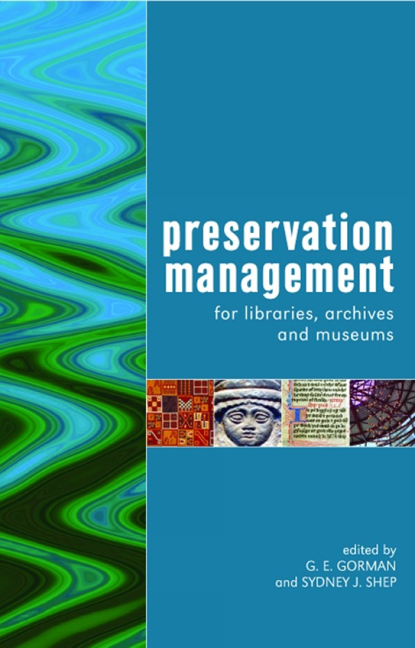Book contents
- Frontmatter
- Contents
- About the contributors
- Introduction
- 1 Managing the documentary heritage: issues for the present and future
- 2 Preservation policy and planning
- 3 Intangible heritage: museums and preservation
- 4 Surrogacy and the artefact
- 5 Moving with the times in search of permanence
- 6 Valuation model for paper conservation research: a new approach for setting research priorities
- 7 Preservation of audiovisual media: traditional to interactive formats
- 8 Challenges of managing the digitally born artefact
- 9 Preserving cultural heritage in times of conflict
- 10 Access and the social contract in memory institutions
- 11 Redefining ‘the collection’ in the 21st century
- Index
6 - Valuation model for paper conservation research: a new approach for setting research priorities
Published online by Cambridge University Press: 08 June 2018
- Frontmatter
- Contents
- About the contributors
- Introduction
- 1 Managing the documentary heritage: issues for the present and future
- 2 Preservation policy and planning
- 3 Intangible heritage: museums and preservation
- 4 Surrogacy and the artefact
- 5 Moving with the times in search of permanence
- 6 Valuation model for paper conservation research: a new approach for setting research priorities
- 7 Preservation of audiovisual media: traditional to interactive formats
- 8 Challenges of managing the digitally born artefact
- 9 Preserving cultural heritage in times of conflict
- 10 Access and the social contract in memory institutions
- 11 Redefining ‘the collection’ in the 21st century
- Index
Summary
[Preservation is] the management of risks to collections to restrict the rate of loss of collection value to an optimum, low level.
(Waller, 2003)[Conservation is] the management of resources, especially but not exclusively, material cultural resources, to prolong the lifetime of material culture, to enhance usability, and to clarify contained messages of various kinds for the continuance and betterment of humanity.
(Rosvall et al., 1995)[Conservation research is] the generation of knowledge that can be applied to achieve a maximum effective collection value through optimisation of the combination of preservation of and access to a collection as a whole, under a given conservation budget.
(this chapter)Introduction
The preservation and conservation of cultural heritage collections are core activities of libraries, archives and museums. They are recognized as important issues that require significant resources. Conservation research, carried out in many locations all over the world by a variety of researchers, forms an integral part of conservation policies. Knowledge generated by conservation research is necessary to underpin sound decision making. Actors involved in conservation research range from specialized conservation scientists and conservators to students of conservation colleges and professionals in related, sometimes industrial, research disciplines. Their work is condensed into an expanding body of literature and knowledge.
It must be recognized that the incentive for conservation research does not always originate from the objective of collection preservation only. The involvement in research of commercial companies may, for example, be motivated by public relations concerns. Non-commercial research institutes almost always act in political environments that may influence the conservation research agenda. We should be aware that these external forces do introduce a risk of biased research. In practice it can be difficult to recognize this potential bias. It is interesting to see, as an example, how and to what extent a major funding programme, such as that of the European Union, has influenced directions in conservation research by importing its political ambitions in research programmes. An overview of several developments and certain ‘trends’ in conservation science is presented in Porck and Teygeler (2000). Another external motive for conservation research (i.e., not instigated by the goal of preservation), is pure scientific curiosity. Scientific curiosity is definitely a vital driving force for any research, but is also difficult to control. At some point research may become an aim in itself and will get detached from its original goals.
- Type
- Chapter
- Information
- Publisher: FacetPrint publication year: 2006



